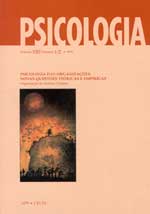Human resources management in smal-medium-size organizations: a case study
DOI:
https://doi.org/10.17575/rpsicol.v13i1/2.568Keywords:
-Abstract
The specialization in management work enabled the development of specialized bodies of knowledge in the several management specialisms. It may however have the unanticipated effect of weakening the pragmatic validity of these bodies of knowledge. The analysis of human resource management knowledge and practice suggests their inadequacy to small – and medium – sized companies. This paper explores this hypothesis through the analysis of human resource management practices in one small company without a differentiated human resource management function. The analysis of the case shows that there are several agents carrying out human resource management related activities, developed through time without explicit co-ordination between them. This way of managing human resource management results nevertheless in human resource management effects that match two important criteria for the management structure: the maintenance of a centralized power structure and the ability to deliver the products in time. This arrangement is unstable given the changes in the company’s environment, changes that have forced the company, among other things, to carry out a quality certification procedure. It does not seem possible however to consider changing the human resource management practices without considering wider changes in the organizing process of the company. This suggests the need to explore more systematically the issue of the pragmatic validity of the specialized body of knowledge of human resource management.


